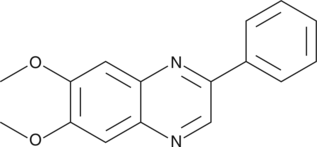Cayman
Showing 8701–8850 of 45550 results
-
AFN-1252 is an inhibitor of staphylococcal enoyl-acyl carrier protein reductase (FabI; Ki = 12.8 nM), an enzyme that activates bacterial fatty acid biosynthesis.{41747,41745,41746} It is selective for isolates of methicillin-susceptible and methicillin-resistant S. aureus (MIC90s = ≤0.008 μg/ml) over isolates of S. pneumoniae, β-hemolytic streptococci, Enterococcus, Enterobacteriaceae, non-fermentative Gram-negative bacilli, and M. catarrhalis (MIC90s = >4 μg/ml). In vivo, AFN-1252 increases survival in a murine acute lethal septicemia model, showing 100% survival when administered at a single oral dose of 1 mg/kg.{41747}
Brand:CaymanSKU:24686 - 10 mgAvailable on backorder
AFN-1252 is an inhibitor of staphylococcal enoyl-acyl carrier protein reductase (FabI; Ki = 12.8 nM), an enzyme that activates bacterial fatty acid biosynthesis.{41747,41745,41746} It is selective for isolates of methicillin-susceptible and methicillin-resistant S. aureus (MIC90s = ≤0.008 μg/ml) over isolates of S. pneumoniae, β-hemolytic streptococci, Enterococcus, Enterobacteriaceae, non-fermentative Gram-negative bacilli, and M. catarrhalis (MIC90s = >4 μg/ml). In vivo, AFN-1252 increases survival in a murine acute lethal septicemia model, showing 100% survival when administered at a single oral dose of 1 mg/kg.{41747}
Brand:CaymanSKU:24686 - 25 mgAvailable on backorder
AFN-1252 is an inhibitor of staphylococcal enoyl-acyl carrier protein reductase (FabI; Ki = 12.8 nM), an enzyme that activates bacterial fatty acid biosynthesis.{41747,41745,41746} It is selective for isolates of methicillin-susceptible and methicillin-resistant S. aureus (MIC90s = ≤0.008 μg/ml) over isolates of S. pneumoniae, β-hemolytic streptococci, Enterococcus, Enterobacteriaceae, non-fermentative Gram-negative bacilli, and M. catarrhalis (MIC90s = >4 μg/ml). In vivo, AFN-1252 increases survival in a murine acute lethal septicemia model, showing 100% survival when administered at a single oral dose of 1 mg/kg.{41747}
Brand:CaymanSKU:24686 - 5 mgAvailable on backorder
Afobazole is a multi-targeted anxiolytic drug with neuroprotective activities.{46420,46421} It binds to the sigma-1, melatonin MT1, and MT3 receptors, as well as monoamine oxidase A (MAO-A; Kis = 5.9, 160, 0.97, and 3.6 µM, respectively, in a radioligand binding assay).{46420} Afobazole (5 mg/kg) decreases the latency to enter, as well as increases the number of entries into and percentage of time spent in, the open arms of the elevated plus maze, indicating anxiolytic-like activity in passive stress-coping BALB/c, but not active stress-coping C57BL/6, mice.{46422} It decreases stroke volume and neuronal and oligodendroglial cell death in the brain in a rat model of ischemia induced by middle cerebral artery occlusion (MCAO) when administered at doses of 0.3 and 3 mg/kg.{46421}
Brand:CaymanSKU:22923 - 1 mgAvailable on backorder
Afobazole is a multi-targeted anxiolytic drug with neuroprotective activities.{46420,46421} It binds to the sigma-1, melatonin MT1, and MT3 receptors, as well as monoamine oxidase A (MAO-A; Kis = 5.9, 160, 0.97, and 3.6 µM, respectively, in a radioligand binding assay).{46420} Afobazole (5 mg/kg) decreases the latency to enter, as well as increases the number of entries into and percentage of time spent in, the open arms of the elevated plus maze, indicating anxiolytic-like activity in passive stress-coping BALB/c, but not active stress-coping C57BL/6, mice.{46422} It decreases stroke volume and neuronal and oligodendroglial cell death in the brain in a rat model of ischemia induced by middle cerebral artery occlusion (MCAO) when administered at doses of 0.3 and 3 mg/kg.{46421}
Brand:CaymanSKU:22923 - 5 mgAvailable on backorder
Prostaglandin I2 is an unstable prostanoid which, through the ‘I prostanoid’ (IP) receptor, inhibits platelet aggregation and promotes vasodilatation in pulmonary vascular beds. AFP 07 is a 7,7-difluoroprostacyclin derivative that acts as a selective and highly potent agonist for the IP receptor (Ki = 0.561 nM).{7236} AFP 07 shows weaker affinity for EP receptors, with Ki values of > 100 nM for EP1-3 and > 10 nM for EP4.{7236} In piglet and rabbit saphenous veins, which express both IP and EP4, the EP4 antagonist AH 23848 reduces AFP 07-mediated relaxation, suggesting that AFP 07 activates EP4 as well as IP, particularly when both receptors are present.{15488}
Brand:CaymanSKU:-Prostaglandin I2 is an unstable prostanoid which, through the ‘I prostanoid’ (IP) receptor, inhibits platelet aggregation and promotes vasodilatation in pulmonary vascular beds. AFP 07 is a 7,7-difluoroprostacyclin derivative that acts as a selective and highly potent agonist for the IP receptor (Ki = 0.561 nM).{7236} AFP 07 shows weaker affinity for EP receptors, with Ki values of > 100 nM for EP1-3 and > 10 nM for EP4.{7236} In piglet and rabbit saphenous veins, which express both IP and EP4, the EP4 antagonist AH 23848 reduces AFP 07-mediated relaxation, suggesting that AFP 07 activates EP4 as well as IP, particularly when both receptors are present.{15488}
Brand:CaymanSKU:-Prostaglandin I2 is an unstable prostanoid which, through the ‘I prostanoid’ (IP) receptor, inhibits platelet aggregation and promotes vasodilatation in pulmonary vascular beds. AFP 07 is a 7,7-difluoroprostacyclin derivative that acts as a selective and highly potent agonist for the IP receptor (Ki = 0.561 nM).{7236} AFP 07 shows weaker affinity for EP receptors, with Ki values of > 100 nM for EP1-3 and > 10 nM for EP4.{7236} In piglet and rabbit saphenous veins, which express both IP and EP4, the EP4 antagonist AH 23848 reduces AFP 07-mediated relaxation, suggesting that AFP 07 activates EP4 as well as IP, particularly when both receptors are present.{15488}
Brand:CaymanSKU:-Aftin-4 is an inducer of amyloid-β (1-42) (Aβ42).{45169} It selectively increases extracellular Aβ42 over Aβ40 production in N2a-AβPP695 cells when used at concentrations ranging from 1 to 100 mM. In vivo, aftin-4 (3-20 nmol/animal, i.c.v.) increases hippocampal Aβ42 content, lipid peroxidation, and production of the pro-inflammatory cytokines IL-1β, IL-6, and TNF-α in mice.{45170} It also induces spatial working and spatial reference memory deficits in mice, effects that are reversed by co-administration of the γ-secretase inhibitor BMS-299,897.
Brand:CaymanSKU:27341 - 1 mgAvailable on backorder
Aftin-4 is an inducer of amyloid-β (1-42) (Aβ42).{45169} It selectively increases extracellular Aβ42 over Aβ40 production in N2a-AβPP695 cells when used at concentrations ranging from 1 to 100 mM. In vivo, aftin-4 (3-20 nmol/animal, i.c.v.) increases hippocampal Aβ42 content, lipid peroxidation, and production of the pro-inflammatory cytokines IL-1β, IL-6, and TNF-α in mice.{45170} It also induces spatial working and spatial reference memory deficits in mice, effects that are reversed by co-administration of the γ-secretase inhibitor BMS-299,897.
Brand:CaymanSKU:27341 - 10 mgAvailable on backorder
Aftin-4 is an inducer of amyloid-β (1-42) (Aβ42).{45169} It selectively increases extracellular Aβ42 over Aβ40 production in N2a-AβPP695 cells when used at concentrations ranging from 1 to 100 mM. In vivo, aftin-4 (3-20 nmol/animal, i.c.v.) increases hippocampal Aβ42 content, lipid peroxidation, and production of the pro-inflammatory cytokines IL-1β, IL-6, and TNF-α in mice.{45170} It also induces spatial working and spatial reference memory deficits in mice, effects that are reversed by co-administration of the γ-secretase inhibitor BMS-299,897.
Brand:CaymanSKU:27341 - 25 mgAvailable on backorder
Aftin-4 is an inducer of amyloid-β (1-42) (Aβ42).{45169} It selectively increases extracellular Aβ42 over Aβ40 production in N2a-AβPP695 cells when used at concentrations ranging from 1 to 100 mM. In vivo, aftin-4 (3-20 nmol/animal, i.c.v.) increases hippocampal Aβ42 content, lipid peroxidation, and production of the pro-inflammatory cytokines IL-1β, IL-6, and TNF-α in mice.{45170} It also induces spatial working and spatial reference memory deficits in mice, effects that are reversed by co-administration of the γ-secretase inhibitor BMS-299,897.
Brand:CaymanSKU:27341 - 5 mgAvailable on backorder
Afuresertib is a selective, orally bioavailable inhibitor of Akt1, 2, and 3 with Ki values of 0.08, 2, and 2.6 nM, respectively.{30969} It preferentially inhibits the proliferation of human cancer cell lines with Akt pathway activation and various cell lines derived from hematologic malignancies with minimal effect on glucose homeostasis.{30969} Afuresertib demonstrates activity against multiple myeloma in both preclinical and clinical models.{30969,30970}
Brand:CaymanSKU:-Available on backorder
Afuresertib is a selective, orally bioavailable inhibitor of Akt1, 2, and 3 with Ki values of 0.08, 2, and 2.6 nM, respectively.{30969} It preferentially inhibits the proliferation of human cancer cell lines with Akt pathway activation and various cell lines derived from hematologic malignancies with minimal effect on glucose homeostasis.{30969} Afuresertib demonstrates activity against multiple myeloma in both preclinical and clinical models.{30969,30970}
Brand:CaymanSKU:-Available on backorder
Afuresertib is a selective, orally bioavailable inhibitor of Akt1, 2, and 3 with Ki values of 0.08, 2, and 2.6 nM, respectively.{30969} It preferentially inhibits the proliferation of human cancer cell lines with Akt pathway activation and various cell lines derived from hematologic malignancies with minimal effect on glucose homeostasis.{30969} Afuresertib demonstrates activity against multiple myeloma in both preclinical and clinical models.{30969,30970}
Brand:CaymanSKU:-Available on backorder
Afuresertib is a selective, orally bioavailable inhibitor of Akt1, 2, and 3 with Ki values of 0.08, 2, and 2.6 nM, respectively.{30969} It preferentially inhibits the proliferation of human cancer cell lines with Akt pathway activation and various cell lines derived from hematologic malignancies with minimal effect on glucose homeostasis.{30969} Afuresertib demonstrates activity against multiple myeloma in both preclinical and clinical models.{30969,30970}
Brand:CaymanSKU:-Available on backorder
Afzelin is a polyphenolic glycoside flavone that has been found in B. pinnatum and has diverse biological activities.{21664,57170,57171} It scavenges 2,2-diphenyl-1-picrylhydrazyl (DPPH; Item No. 14805) radicals with an IC50 value of 6.44 μg/ml.{21664} Afzelin is active against S. aureus, P. aeruginosa, S. typhi, C. albicans, C. parapsilosis, and C. neoformans (MICs = 8, 16, 2, 16, 4, and 4 μg/ml, respectively). It inhibits the proliferation of A549, SKOV3, and SK-MEL-2 cells (EC50s = 40.6, 34.5, and 33.9 μg/ml, respectively).{57170} Afzelin (26 mg/kg per day) reduces the number of eosinophils, other inflammatory cells, and total cells, as well as the levels of IL-4, IL-5, and IL-13, in bronchoalveolar lavage fluid (BALF) in a mouse model of allergic asthma.{57171}
Brand:CaymanSKU:31135 - 1 mgAvailable on backorder
Afzelin is a polyphenolic glycoside flavone that has been found in B. pinnatum and has diverse biological activities.{21664,57170,57171} It scavenges 2,2-diphenyl-1-picrylhydrazyl (DPPH; Item No. 14805) radicals with an IC50 value of 6.44 μg/ml.{21664} Afzelin is active against S. aureus, P. aeruginosa, S. typhi, C. albicans, C. parapsilosis, and C. neoformans (MICs = 8, 16, 2, 16, 4, and 4 μg/ml, respectively). It inhibits the proliferation of A549, SKOV3, and SK-MEL-2 cells (EC50s = 40.6, 34.5, and 33.9 μg/ml, respectively).{57170} Afzelin (26 mg/kg per day) reduces the number of eosinophils, other inflammatory cells, and total cells, as well as the levels of IL-4, IL-5, and IL-13, in bronchoalveolar lavage fluid (BALF) in a mouse model of allergic asthma.{57171}
Brand:CaymanSKU:31135 - 10 mgAvailable on backorder
Afzelin is a polyphenolic glycoside flavone that has been found in B. pinnatum and has diverse biological activities.{21664,57170,57171} It scavenges 2,2-diphenyl-1-picrylhydrazyl (DPPH; Item No. 14805) radicals with an IC50 value of 6.44 μg/ml.{21664} Afzelin is active against S. aureus, P. aeruginosa, S. typhi, C. albicans, C. parapsilosis, and C. neoformans (MICs = 8, 16, 2, 16, 4, and 4 μg/ml, respectively). It inhibits the proliferation of A549, SKOV3, and SK-MEL-2 cells (EC50s = 40.6, 34.5, and 33.9 μg/ml, respectively).{57170} Afzelin (26 mg/kg per day) reduces the number of eosinophils, other inflammatory cells, and total cells, as well as the levels of IL-4, IL-5, and IL-13, in bronchoalveolar lavage fluid (BALF) in a mouse model of allergic asthma.{57171}
Brand:CaymanSKU:31135 - 25 mgAvailable on backorder
Afzelin is a polyphenolic glycoside flavone that has been found in B. pinnatum and has diverse biological activities.{21664,57170,57171} It scavenges 2,2-diphenyl-1-picrylhydrazyl (DPPH; Item No. 14805) radicals with an IC50 value of 6.44 μg/ml.{21664} Afzelin is active against S. aureus, P. aeruginosa, S. typhi, C. albicans, C. parapsilosis, and C. neoformans (MICs = 8, 16, 2, 16, 4, and 4 μg/ml, respectively). It inhibits the proliferation of A549, SKOV3, and SK-MEL-2 cells (EC50s = 40.6, 34.5, and 33.9 μg/ml, respectively).{57170} Afzelin (26 mg/kg per day) reduces the number of eosinophils, other inflammatory cells, and total cells, as well as the levels of IL-4, IL-5, and IL-13, in bronchoalveolar lavage fluid (BALF) in a mouse model of allergic asthma.{57171}
Brand:CaymanSKU:31135 - 5 mgAvailable on backorder
The peptide hormone gastrin acts through G protein-coupled cholecystokinin-2 (CCK2) receptors to regulate cell proliferation, differentiation, apoptosis, and gene expression of gastrointestinal cells and exerts trophic effects on a number of gastric cancer cell lines. AG-041R is a potent gastrin/CCK2 receptor antagonist that exhibits selective binding for CCK2 compared to CCK1.{16543} AG-041R inhibits gastrin-evoked secretion of pancreastatin (IC50 = 2.2 nM) as well as gastrin-induced histamine release and cell growth of Mastomys ECL carcinoid tumor cells.{16543,16568} AG-041R (1 µM) exhibits synergistic inhibitory effects on the cell viability of human gastric cancer cells when administered in combination with the selective COX-2 inhibitor NS-398 (Item No. 70590) at 10 µM.{16544}
Brand:CaymanSKU:10010129 - 1 mgAvailable on backorder
The peptide hormone gastrin acts through G protein-coupled cholecystokinin-2 (CCK2) receptors to regulate cell proliferation, differentiation, apoptosis, and gene expression of gastrointestinal cells and exerts trophic effects on a number of gastric cancer cell lines. AG-041R is a potent gastrin/CCK2 receptor antagonist that exhibits selective binding for CCK2 compared to CCK1.{16543} AG-041R inhibits gastrin-evoked secretion of pancreastatin (IC50 = 2.2 nM) as well as gastrin-induced histamine release and cell growth of Mastomys ECL carcinoid tumor cells.{16543,16568} AG-041R (1 µM) exhibits synergistic inhibitory effects on the cell viability of human gastric cancer cells when administered in combination with the selective COX-2 inhibitor NS-398 (Item No. 70590) at 10 µM.{16544}
Brand:CaymanSKU:10010129 - 10 mgAvailable on backorder
The peptide hormone gastrin acts through G protein-coupled cholecystokinin-2 (CCK2) receptors to regulate cell proliferation, differentiation, apoptosis, and gene expression of gastrointestinal cells and exerts trophic effects on a number of gastric cancer cell lines. AG-041R is a potent gastrin/CCK2 receptor antagonist that exhibits selective binding for CCK2 compared to CCK1.{16543} AG-041R inhibits gastrin-evoked secretion of pancreastatin (IC50 = 2.2 nM) as well as gastrin-induced histamine release and cell growth of Mastomys ECL carcinoid tumor cells.{16543,16568} AG-041R (1 µM) exhibits synergistic inhibitory effects on the cell viability of human gastric cancer cells when administered in combination with the selective COX-2 inhibitor NS-398 (Item No. 70590) at 10 µM.{16544}
Brand:CaymanSKU:10010129 - 5 mgAvailable on backorder
The peptide hormone gastrin acts through G protein-coupled cholecystokinin-2 (CCK2) receptors to regulate cell proliferation, differentiation, apoptosis, and gene expression of gastrointestinal cells and exerts trophic effects on a number of gastric cancer cell lines. AG-041R is a potent gastrin/CCK2 receptor antagonist that exhibits selective binding for CCK2 compared to CCK1.{16543} AG-041R inhibits gastrin-evoked secretion of pancreastatin (IC50 = 2.2 nM) as well as gastrin-induced histamine release and cell growth of Mastomys ECL carcinoid tumor cells.{16543,16568} AG-041R (1 µM) exhibits synergistic inhibitory effects on the cell viability of human gastric cancer cells when administered in combination with the selective COX-2 inhibitor NS-398 (Item No. 70590) at 10 µM.{16544}
Brand:CaymanSKU:10010129 - 50 mgAvailable on backorder
The binding of insulin-like growth factor 1 (IGF-1) to the IGF-1 receptor (IGF-1R) initiates a cascade of reactions that promote cell growth and transformation by activating the PI3K/Akt signaling pathway, inhibiting apoptotic pathways, and mediating mitogenic actions. Overexpression of IGF-1R confers tumorigenic potential to cells as well as protection from apoptosis. AG-1024 is a selective inhibitor of IGF-1R that inhibits insulin-stimulated cellular proliferation and IGF-1R autophosphorylation with IC50 values of 0.4 and 7 μM, respectively.{23639} At 10 nM, AG-1024 can inhibit proliferation and induce apoptosis in human breast cancer MCF-7 cells, and it inhibits autocrine growth of human prostate cancer DU145 cells with an IC50 value of 2.5 μM.{23640,23641}
Brand:CaymanSKU:-The binding of insulin-like growth factor 1 (IGF-1) to the IGF-1 receptor (IGF-1R) initiates a cascade of reactions that promote cell growth and transformation by activating the PI3K/Akt signaling pathway, inhibiting apoptotic pathways, and mediating mitogenic actions. Overexpression of IGF-1R confers tumorigenic potential to cells as well as protection from apoptosis. AG-1024 is a selective inhibitor of IGF-1R that inhibits insulin-stimulated cellular proliferation and IGF-1R autophosphorylation with IC50 values of 0.4 and 7 μM, respectively.{23639} At 10 nM, AG-1024 can inhibit proliferation and induce apoptosis in human breast cancer MCF-7 cells, and it inhibits autocrine growth of human prostate cancer DU145 cells with an IC50 value of 2.5 μM.{23640,23641}
Brand:CaymanSKU:-The binding of insulin-like growth factor 1 (IGF-1) to the IGF-1 receptor (IGF-1R) initiates a cascade of reactions that promote cell growth and transformation by activating the PI3K/Akt signaling pathway, inhibiting apoptotic pathways, and mediating mitogenic actions. Overexpression of IGF-1R confers tumorigenic potential to cells as well as protection from apoptosis. AG-1024 is a selective inhibitor of IGF-1R that inhibits insulin-stimulated cellular proliferation and IGF-1R autophosphorylation with IC50 values of 0.4 and 7 μM, respectively.{23639} At 10 nM, AG-1024 can inhibit proliferation and induce apoptosis in human breast cancer MCF-7 cells, and it inhibits autocrine growth of human prostate cancer DU145 cells with an IC50 value of 2.5 μM.{23640,23641}
Brand:CaymanSKU:-AG-120 is an orally available inhibitor of isocitrate dehydrogenase type 1 (IDH1) that specifically inhibits a mutated form of IDH1 in the cytoplasm, preventing the formation of 2-hydroxyglutarate.{32361} AG-120 may induce cellular differentiation as well as inhibit proliferation in IDH1-expressing tumor cells.{32361}
Brand:CaymanSKU:19894 -Available on backorder
AG-120 is an orally available inhibitor of isocitrate dehydrogenase type 1 (IDH1) that specifically inhibits a mutated form of IDH1 in the cytoplasm, preventing the formation of 2-hydroxyglutarate.{32361} AG-120 may induce cellular differentiation as well as inhibit proliferation in IDH1-expressing tumor cells.{32361}
Brand:CaymanSKU:19894 -Available on backorder
AG-120 is an orally available inhibitor of isocitrate dehydrogenase type 1 (IDH1) that specifically inhibits a mutated form of IDH1 in the cytoplasm, preventing the formation of 2-hydroxyglutarate.{32361} AG-120 may induce cellular differentiation as well as inhibit proliferation in IDH1-expressing tumor cells.{32361}
Brand:CaymanSKU:19894 -Available on backorder
AG-120 is an orally available inhibitor of isocitrate dehydrogenase type 1 (IDH1) that specifically inhibits a mutated form of IDH1 in the cytoplasm, preventing the formation of 2-hydroxyglutarate.{32361} AG-120 may induce cellular differentiation as well as inhibit proliferation in IDH1-expressing tumor cells.{32361}
Brand:CaymanSKU:19894 -Available on backorder
Tyrphostins are a family of protein tyrosine kinase inhibitors originally developed to inhibit cell growth by blocking the activity of certain growth factor receptor kinases (GFRK). The tyrphostin AG-126 selectively inhibits the phosphorylation of ERK1 (p44) and ERK2 (p42) at 25-50 μM.{17267,17268} It blocks the production of TNF-α in vitro{17268} and in vivo,{17267} attenuating signaling through NF-κB,{17267} the induced expression of COX-2 and iNOS,{17269,17266} and the inflammatory response in diverse animal models.{17269,17270} AG-126 is a poor inhibitor of epidermal GFRK (IC50 = 450 μM){14963} and platelet-derived GFRK (IC50 > 100 μM).{14964}
Brand:CaymanSKU:-Tyrphostins are a family of protein tyrosine kinase inhibitors originally developed to inhibit cell growth by blocking the activity of certain growth factor receptor kinases (GFRK). The tyrphostin AG-126 selectively inhibits the phosphorylation of ERK1 (p44) and ERK2 (p42) at 25-50 μM.{17267,17268} It blocks the production of TNF-α in vitro{17268} and in vivo,{17267} attenuating signaling through NF-κB,{17267} the induced expression of COX-2 and iNOS,{17269,17266} and the inflammatory response in diverse animal models.{17269,17270} AG-126 is a poor inhibitor of epidermal GFRK (IC50 = 450 μM){14963} and platelet-derived GFRK (IC50 > 100 μM).{14964}
Brand:CaymanSKU:-Tyrphostins are a family of protein tyrosine kinase inhibitors originally developed to inhibit cell growth by blocking the activity of certain growth factor receptor kinases (GFRK). The tyrphostin AG-126 selectively inhibits the phosphorylation of ERK1 (p44) and ERK2 (p42) at 25-50 μM.{17267,17268} It blocks the production of TNF-α in vitro{17268} and in vivo,{17267} attenuating signaling through NF-κB,{17267} the induced expression of COX-2 and iNOS,{17269,17266} and the inflammatory response in diverse animal models.{17269,17270} AG-126 is a poor inhibitor of epidermal GFRK (IC50 = 450 μM){14963} and platelet-derived GFRK (IC50 > 100 μM).{14964}
Brand:CaymanSKU:-Tyrphostins are a family of protein tyrosine kinase inhibitors originally developed to inhibit cell growth by blocking the activity of certain growth factor receptor kinases (GFRK). The tyrphostin AG-126 selectively inhibits the phosphorylation of ERK1 (p44) and ERK2 (p42) at 25-50 μM.{17267,17268} It blocks the production of TNF-α in vitro{17268} and in vivo,{17267} attenuating signaling through NF-κB,{17267} the induced expression of COX-2 and iNOS,{17269,17266} and the inflammatory response in diverse animal models.{17269,17270} AG-126 is a poor inhibitor of epidermal GFRK (IC50 = 450 μM){14963} and platelet-derived GFRK (IC50 > 100 μM).{14964}
Brand:CaymanSKU:-Protein tyrosine kinase (PTK) inhibitors are potential antiproliferative agents for diseases caused by the hyperactivity of PTKs. Tyrphostins are a class of antiproliferative compounds which act as PTK blockers. PTK inhibitors specific for platelet-derived growth factor (PDGF) receptor kinase could help in the treatment of atherosclerosis, restenosis, pulmonary fibrosis, and gliomas.{15153} AG-1295 is a quinoxaline-type tyrphostin that acts as a potent and selective inhibitor of PDGF receptor kinase in vitro and in Swiss 3T3 cells (IC50s range from 0.3-1 µM).{15594} It inhibits PDGF-stimulated DNA synthesis with an IC50 value of 2.5 µM without affecting activity of the EGF receptor.{15594}
Brand:CaymanSKU:-Protein tyrosine kinase (PTK) inhibitors are potential antiproliferative agents for diseases caused by the hyperactivity of PTKs. Tyrphostins are a class of antiproliferative compounds which act as PTK blockers. PTK inhibitors specific for platelet-derived growth factor (PDGF) receptor kinase could help in the treatment of atherosclerosis, restenosis, pulmonary fibrosis, and gliomas.{15153} AG-1295 is a quinoxaline-type tyrphostin that acts as a potent and selective inhibitor of PDGF receptor kinase in vitro and in Swiss 3T3 cells (IC50s range from 0.3-1 µM).{15594} It inhibits PDGF-stimulated DNA synthesis with an IC50 value of 2.5 µM without affecting activity of the EGF receptor.{15594}
Brand:CaymanSKU:-Protein tyrosine kinase (PTK) inhibitors are potential antiproliferative agents for diseases caused by the hyperactivity of PTKs. Tyrphostins are a class of antiproliferative compounds which act as PTK blockers. PTK inhibitors specific for platelet-derived growth factor (PDGF) receptor kinase could help in the treatment of atherosclerosis, restenosis, pulmonary fibrosis, and gliomas.{15153} AG-1295 is a quinoxaline-type tyrphostin that acts as a potent and selective inhibitor of PDGF receptor kinase in vitro and in Swiss 3T3 cells (IC50s range from 0.3-1 µM).{15594} It inhibits PDGF-stimulated DNA synthesis with an IC50 value of 2.5 µM without affecting activity of the EGF receptor.{15594}
Brand:CaymanSKU:-Protein tyrosine kinase (PTK) inhibitors are potential antiproliferative agents for diseases caused by the hyperactivity of PTKs. Tyrphostins are a class of antiproliferative compounds which act as PTK blockers. PTK inhibitors specific for platelet-derived growth factor (PDGF) receptor kinase could help in the treatment of atherosclerosis, restenosis, pulmonary fibrosis, and gliomas.{15153} AG-1295 is a quinoxaline-type tyrphostin that acts as a potent and selective inhibitor of PDGF receptor kinase in vitro and in Swiss 3T3 cells (IC50s range from 0.3-1 µM).{15594} It inhibits PDGF-stimulated DNA synthesis with an IC50 value of 2.5 µM without affecting activity of the EGF receptor.{15594}
Brand:CaymanSKU:-Protein tyrosine kinase (PTK) inhibitors are potential antiproliferative agents for diseases caused by the hyperactivity of PTKs. Tyrphostins are a class of antiproliferative compounds which act as PTK blockers. PTK inhibitors specific for platelet-derived growth factor (PDGF) receptor kinase could help in the treatment of atherosclerosis, restenosis, pulmonary fibrosis, and gliomas.{15153} AG-1296 is a potent and selective inhibitor of PDGF receptor kinase with an IC50 value of about 0.4 µM both in vitro and in cells (Swiss 3T3 cells).{15594} It inhibits ligand-stimulated DNA synthesis in platelet-derived growth factor receptor and stem cell factor/kit receptor transfected cells with an IC50 values of 1.5 and 1.8 µM, respectively. {15594} Treatment of sis oncogene transfected NIH3T3 cells with AG-1296 reverses the transformed phenotype.{15594}
Brand:CaymanSKU:10010592 - 1 mgAvailable on backorder
Protein tyrosine kinase (PTK) inhibitors are potential antiproliferative agents for diseases caused by the hyperactivity of PTKs. Tyrphostins are a class of antiproliferative compounds which act as PTK blockers. PTK inhibitors specific for platelet-derived growth factor (PDGF) receptor kinase could help in the treatment of atherosclerosis, restenosis, pulmonary fibrosis, and gliomas.{15153} AG-1296 is a potent and selective inhibitor of PDGF receptor kinase with an IC50 value of about 0.4 µM both in vitro and in cells (Swiss 3T3 cells).{15594} It inhibits ligand-stimulated DNA synthesis in platelet-derived growth factor receptor and stem cell factor/kit receptor transfected cells with an IC50 values of 1.5 and 1.8 µM, respectively. {15594} Treatment of sis oncogene transfected NIH3T3 cells with AG-1296 reverses the transformed phenotype.{15594}
Brand:CaymanSKU:10010592 - 10 mgAvailable on backorder
Protein tyrosine kinase (PTK) inhibitors are potential antiproliferative agents for diseases caused by the hyperactivity of PTKs. Tyrphostins are a class of antiproliferative compounds which act as PTK blockers. PTK inhibitors specific for platelet-derived growth factor (PDGF) receptor kinase could help in the treatment of atherosclerosis, restenosis, pulmonary fibrosis, and gliomas.{15153} AG-1296 is a potent and selective inhibitor of PDGF receptor kinase with an IC50 value of about 0.4 µM both in vitro and in cells (Swiss 3T3 cells).{15594} It inhibits ligand-stimulated DNA synthesis in platelet-derived growth factor receptor and stem cell factor/kit receptor transfected cells with an IC50 values of 1.5 and 1.8 µM, respectively. {15594} Treatment of sis oncogene transfected NIH3T3 cells with AG-1296 reverses the transformed phenotype.{15594}
Brand:CaymanSKU:10010592 - 25 mgAvailable on backorder
Protein tyrosine kinase (PTK) inhibitors are potential antiproliferative agents for diseases caused by the hyperactivity of PTKs. Tyrphostins are a class of antiproliferative compounds which act as PTK blockers. PTK inhibitors specific for platelet-derived growth factor (PDGF) receptor kinase could help in the treatment of atherosclerosis, restenosis, pulmonary fibrosis, and gliomas.{15153} AG-1296 is a potent and selective inhibitor of PDGF receptor kinase with an IC50 value of about 0.4 µM both in vitro and in cells (Swiss 3T3 cells).{15594} It inhibits ligand-stimulated DNA synthesis in platelet-derived growth factor receptor and stem cell factor/kit receptor transfected cells with an IC50 values of 1.5 and 1.8 µM, respectively. {15594} Treatment of sis oncogene transfected NIH3T3 cells with AG-1296 reverses the transformed phenotype.{15594}
Brand:CaymanSKU:10010592 - 5 mgAvailable on backorder
AG-14361 is an inhibitor of poly(ADP-ribose) polymerase 1 (PARP1; Ki = 6.3 nM for the human enzyme).{43030} It inhibits PARP1 activity in permeabilized and intact SW620 cells (IC50s = 29 and 14 nM, respectively).{43031} AG-14361 (0.4 µM) potentiates the growth inhibitory effects of temozolomide (Item No. 14163) in HCT116, A2480, and CP70 cells and of the topoisomerase I inhibitor topotecan (Item No. 14129) by greater than three-fold in PARP1+/+ primary embryonic fibroblasts.{43032,43033} It slows the rejoining of camptothecin-induced DNA strand breaks.{43033} AG-14361 also inhibits cell growth in a PARP1-independent manner with GI50 values of 66 and 65 µM, respectively, in cell lines derived from PARP1+/+ and PARP1-/- mice.{43031} AG-14361 (15 mg/kg), in combination with temozolomide, leads to tumor regression in an SW620 mouse xenograft model.
Brand:CaymanSKU:24677 - 1 mgAvailable on backorder
AG-14361 is an inhibitor of poly(ADP-ribose) polymerase 1 (PARP1; Ki = 6.3 nM for the human enzyme).{43030} It inhibits PARP1 activity in permeabilized and intact SW620 cells (IC50s = 29 and 14 nM, respectively).{43031} AG-14361 (0.4 µM) potentiates the growth inhibitory effects of temozolomide (Item No. 14163) in HCT116, A2480, and CP70 cells and of the topoisomerase I inhibitor topotecan (Item No. 14129) by greater than three-fold in PARP1+/+ primary embryonic fibroblasts.{43032,43033} It slows the rejoining of camptothecin-induced DNA strand breaks.{43033} AG-14361 also inhibits cell growth in a PARP1-independent manner with GI50 values of 66 and 65 µM, respectively, in cell lines derived from PARP1+/+ and PARP1-/- mice.{43031} AG-14361 (15 mg/kg), in combination with temozolomide, leads to tumor regression in an SW620 mouse xenograft model.
Brand:CaymanSKU:24677 - 10 mgAvailable on backorder
AG-14361 is an inhibitor of poly(ADP-ribose) polymerase 1 (PARP1; Ki = 6.3 nM for the human enzyme).{43030} It inhibits PARP1 activity in permeabilized and intact SW620 cells (IC50s = 29 and 14 nM, respectively).{43031} AG-14361 (0.4 µM) potentiates the growth inhibitory effects of temozolomide (Item No. 14163) in HCT116, A2480, and CP70 cells and of the topoisomerase I inhibitor topotecan (Item No. 14129) by greater than three-fold in PARP1+/+ primary embryonic fibroblasts.{43032,43033} It slows the rejoining of camptothecin-induced DNA strand breaks.{43033} AG-14361 also inhibits cell growth in a PARP1-independent manner with GI50 values of 66 and 65 µM, respectively, in cell lines derived from PARP1+/+ and PARP1-/- mice.{43031} AG-14361 (15 mg/kg), in combination with temozolomide, leads to tumor regression in an SW620 mouse xenograft model.
Brand:CaymanSKU:24677 - 25 mgAvailable on backorder
AG-14361 is an inhibitor of poly(ADP-ribose) polymerase 1 (PARP1; Ki = 6.3 nM for the human enzyme).{43030} It inhibits PARP1 activity in permeabilized and intact SW620 cells (IC50s = 29 and 14 nM, respectively).{43031} AG-14361 (0.4 µM) potentiates the growth inhibitory effects of temozolomide (Item No. 14163) in HCT116, A2480, and CP70 cells and of the topoisomerase I inhibitor topotecan (Item No. 14129) by greater than three-fold in PARP1+/+ primary embryonic fibroblasts.{43032,43033} It slows the rejoining of camptothecin-induced DNA strand breaks.{43033} AG-14361 also inhibits cell growth in a PARP1-independent manner with GI50 values of 66 and 65 µM, respectively, in cell lines derived from PARP1+/+ and PARP1-/- mice.{43031} AG-14361 (15 mg/kg), in combination with temozolomide, leads to tumor regression in an SW620 mouse xenograft model.
Brand:CaymanSKU:24677 - 5 mgAvailable on backorder
Protein tyrosine kinase (PTK) inhibitors are potential antiproliferative agents for diseases caused by the hyperactivity of PTK. Tyrphostins are a class of antiproliferative compounds which act as PTK blockers. PTK inhibitors which preferentially inhibit the epidermal growth factor receptor (EGFR) kinase and block EGFR-dependent cell proliferation. AG-1478 is an inhibitor of EGFR kinase with an IC50 value of 3 nM.{15153} Due to its potency and selectivity, AG-1478 has been used in a broad range of studies. It reversibly inhibits rat brain Kv1.5 potassium channels (IC50 = 9.8 µM) independent of protein tyrosine kinase (PTK) activity.{15592} AG-1478 also inhibits the growth of leiomyoma and myometrium cell cultures with IC50 values of 5.6 and 5.7 µM, respectively.{15593} This inhibitor suppresses MAP kinase activation and strongly inhibits induction of fos gene expression and DNA synthesis.{15591}
Brand:CaymanSKU:10010244 - 1 mgAvailable on backorder
Protein tyrosine kinase (PTK) inhibitors are potential antiproliferative agents for diseases caused by the hyperactivity of PTK. Tyrphostins are a class of antiproliferative compounds which act as PTK blockers. PTK inhibitors which preferentially inhibit the epidermal growth factor receptor (EGFR) kinase and block EGFR-dependent cell proliferation. AG-1478 is an inhibitor of EGFR kinase with an IC50 value of 3 nM.{15153} Due to its potency and selectivity, AG-1478 has been used in a broad range of studies. It reversibly inhibits rat brain Kv1.5 potassium channels (IC50 = 9.8 µM) independent of protein tyrosine kinase (PTK) activity.{15592} AG-1478 also inhibits the growth of leiomyoma and myometrium cell cultures with IC50 values of 5.6 and 5.7 µM, respectively.{15593} This inhibitor suppresses MAP kinase activation and strongly inhibits induction of fos gene expression and DNA synthesis.{15591}
Brand:CaymanSKU:10010244 - 10 mgAvailable on backorder
Protein tyrosine kinase (PTK) inhibitors are potential antiproliferative agents for diseases caused by the hyperactivity of PTK. Tyrphostins are a class of antiproliferative compounds which act as PTK blockers. PTK inhibitors which preferentially inhibit the epidermal growth factor receptor (EGFR) kinase and block EGFR-dependent cell proliferation. AG-1478 is an inhibitor of EGFR kinase with an IC50 value of 3 nM.{15153} Due to its potency and selectivity, AG-1478 has been used in a broad range of studies. It reversibly inhibits rat brain Kv1.5 potassium channels (IC50 = 9.8 µM) independent of protein tyrosine kinase (PTK) activity.{15592} AG-1478 also inhibits the growth of leiomyoma and myometrium cell cultures with IC50 values of 5.6 and 5.7 µM, respectively.{15593} This inhibitor suppresses MAP kinase activation and strongly inhibits induction of fos gene expression and DNA synthesis.{15591}
Brand:CaymanSKU:10010244 - 25 mgAvailable on backorder
Protein tyrosine kinase (PTK) inhibitors are potential antiproliferative agents for diseases caused by the hyperactivity of PTK. Tyrphostins are a class of antiproliferative compounds which act as PTK blockers. PTK inhibitors which preferentially inhibit the epidermal growth factor receptor (EGFR) kinase and block EGFR-dependent cell proliferation. AG-1478 is an inhibitor of EGFR kinase with an IC50 value of 3 nM.{15153} Due to its potency and selectivity, AG-1478 has been used in a broad range of studies. It reversibly inhibits rat brain Kv1.5 potassium channels (IC50 = 9.8 µM) independent of protein tyrosine kinase (PTK) activity.{15592} AG-1478 also inhibits the growth of leiomyoma and myometrium cell cultures with IC50 values of 5.6 and 5.7 µM, respectively.{15593} This inhibitor suppresses MAP kinase activation and strongly inhibits induction of fos gene expression and DNA synthesis.{15591}
Brand:CaymanSKU:10010244 - 5 mgAvailable on backorder
AG-1557 is an inhibitor of epidermal growth factor receptor (EGFR) tyrosine kinase with a pIC50 value of 8.194.{32831}
Brand:CaymanSKU:-Available on backorder
AG-1557 is an inhibitor of epidermal growth factor receptor (EGFR) tyrosine kinase with a pIC50 value of 8.194.{32831}
Brand:CaymanSKU:-Available on backorder
AG-1557 is an inhibitor of epidermal growth factor receptor (EGFR) tyrosine kinase with a pIC50 value of 8.194.{32831}
Brand:CaymanSKU:-Available on backorder
AG-1557 is an inhibitor of epidermal growth factor receptor (EGFR) tyrosine kinase with a pIC50 value of 8.194.{32831}
Brand:CaymanSKU:-Available on backorder
Protein tyrosine kinase (PTK) inhibitors are potential antiproliferative agents for diseases caused by the hyperactivity of protein tyrosine kinases. Tyrphostins are a class of antiproliferative compounds which act as protein tryrosine kinase blockers. PTK inhibitors which preferentially inhibit the epidermal growth factor (EGF) receptor kinase block EGF-dependent cell proliferation.{14963} AG-17 is an inhibitor of epidermal growth factor (EGF) receptor kinase with an IC50 value of 460 µM in the human epidermoid carcinoma cell line A431.{14963}
Brand:CaymanSKU:10010248 - 10 mgAvailable on backorder
Protein tyrosine kinase (PTK) inhibitors are potential antiproliferative agents for diseases caused by the hyperactivity of protein tyrosine kinases. Tyrphostins are a class of antiproliferative compounds which act as protein tryrosine kinase blockers. PTK inhibitors which preferentially inhibit the epidermal growth factor (EGF) receptor kinase block EGF-dependent cell proliferation.{14963} AG-17 is an inhibitor of epidermal growth factor (EGF) receptor kinase with an IC50 value of 460 µM in the human epidermoid carcinoma cell line A431.{14963}
Brand:CaymanSKU:10010248 - 25 mgAvailable on backorder
Protein tyrosine kinase (PTK) inhibitors are potential antiproliferative agents for diseases caused by the hyperactivity of protein tyrosine kinases. Tyrphostins are a class of antiproliferative compounds which act as protein tryrosine kinase blockers. PTK inhibitors which preferentially inhibit the epidermal growth factor (EGF) receptor kinase block EGF-dependent cell proliferation.{14963} AG-17 is an inhibitor of epidermal growth factor (EGF) receptor kinase with an IC50 value of 460 µM in the human epidermoid carcinoma cell line A431.{14963}
Brand:CaymanSKU:10010248 - 5 mgAvailable on backorder
Protein tyrosine kinase (PTK) inhibitors are potential antiproliferative agents for diseases caused by the hyperactivity of protein tyrosine kinases. Tyrphostins are a class of antiproliferative compounds which act as protein tryrosine kinase blockers. PTK inhibitors which preferentially inhibit the epidermal growth factor (EGF) receptor kinase block EGF-dependent cell proliferation.{14963} AG-17 is an inhibitor of epidermal growth factor (EGF) receptor kinase with an IC50 value of 460 µM in the human epidermoid carcinoma cell line A431.{14963}
Brand:CaymanSKU:10010248 - 50 mgAvailable on backorder
Protein tyrosine kinase (PTK) inhibitors are potential antiproliferative agents for diseases caused by the hyperactivity of PTKs. Tyrphostins are a class of antiproliferative compounds which act as protein tryrosine kinase blockers. PTK inhibitors which preferentially inhibit the epidermal growth factor (EGF) receptor kinase block EGF-dependent cell proliferation.{14963} AG-18 is an inhibitor of epidermal growth factor (EGF) receptor kinase with an IC50 value of 35 µM in the human epidermoid carcinoma cell line A431.{14963}
Brand:CaymanSKU:10010300 - 10 mgAvailable on backorder
Protein tyrosine kinase (PTK) inhibitors are potential antiproliferative agents for diseases caused by the hyperactivity of PTKs. Tyrphostins are a class of antiproliferative compounds which act as protein tryrosine kinase blockers. PTK inhibitors which preferentially inhibit the epidermal growth factor (EGF) receptor kinase block EGF-dependent cell proliferation.{14963} AG-18 is an inhibitor of epidermal growth factor (EGF) receptor kinase with an IC50 value of 35 µM in the human epidermoid carcinoma cell line A431.{14963}
Brand:CaymanSKU:10010300 - 25 mgAvailable on backorder
Protein tyrosine kinase (PTK) inhibitors are potential antiproliferative agents for diseases caused by the hyperactivity of PTKs. Tyrphostins are a class of antiproliferative compounds which act as protein tryrosine kinase blockers. PTK inhibitors which preferentially inhibit the epidermal growth factor (EGF) receptor kinase block EGF-dependent cell proliferation.{14963} AG-18 is an inhibitor of epidermal growth factor (EGF) receptor kinase with an IC50 value of 35 µM in the human epidermoid carcinoma cell line A431.{14963}
Brand:CaymanSKU:10010300 - 5 mgAvailable on backorder
Protein tyrosine kinase (PTK) inhibitors are potential antiproliferative agents for diseases caused by the hyperactivity of PTKs. Tyrphostins are a class of antiproliferative compounds which act as protein tryrosine kinase blockers. PTK inhibitors which preferentially inhibit the epidermal growth factor (EGF) receptor kinase block EGF-dependent cell proliferation.{14963} AG-18 is an inhibitor of epidermal growth factor (EGF) receptor kinase with an IC50 value of 35 µM in the human epidermoid carcinoma cell line A431.{14963}
Brand:CaymanSKU:10010300 - 50 mgAvailable on backorder
Protein tyrosine kinase (PTK) inhibitors are potential antiproliferative agents for diseases caused by the hyperactivity of PTKs. Tyrphostins are a class of antiproliferative compounds which act as PTK blockers. PTK inhibitors which preferentially inhibit the epidermal growth factor (EGF) receptor kinase block EGF-dependent cell proliferation.{14963} AG-183 is an inhibitor of epidermal growth factor (EGF) receptor kinase with an IC50 value of 0.8 µM in the human epidermoid carcinoma cell line A431.{14963}
Brand:CaymanSKU:10010315 - 10 mgAvailable on backorder
Protein tyrosine kinase (PTK) inhibitors are potential antiproliferative agents for diseases caused by the hyperactivity of PTKs. Tyrphostins are a class of antiproliferative compounds which act as PTK blockers. PTK inhibitors which preferentially inhibit the epidermal growth factor (EGF) receptor kinase block EGF-dependent cell proliferation.{14963} AG-183 is an inhibitor of epidermal growth factor (EGF) receptor kinase with an IC50 value of 0.8 µM in the human epidermoid carcinoma cell line A431.{14963}
Brand:CaymanSKU:10010315 - 25 mgAvailable on backorder
Protein tyrosine kinase (PTK) inhibitors are potential antiproliferative agents for diseases caused by the hyperactivity of PTKs. Tyrphostins are a class of antiproliferative compounds which act as PTK blockers. PTK inhibitors which preferentially inhibit the epidermal growth factor (EGF) receptor kinase block EGF-dependent cell proliferation.{14963} AG-183 is an inhibitor of epidermal growth factor (EGF) receptor kinase with an IC50 value of 0.8 µM in the human epidermoid carcinoma cell line A431.{14963}
Brand:CaymanSKU:10010315 - 5 mgAvailable on backorder
Protein tyrosine kinase (PTK) inhibitors are potential antiproliferative agents for diseases caused by the hyperactivity of PTKs. Tyrphostins are a class of antiproliferative compounds which act as PTK blockers. PTK inhibitors which preferentially inhibit the epidermal growth factor (EGF) receptor kinase block EGF-dependent cell proliferation.{14963} AG-183 is an inhibitor of epidermal growth factor (EGF) receptor kinase with an IC50 value of 0.8 µM in the human epidermoid carcinoma cell line A431.{14963}
Brand:CaymanSKU:10010315 - 50 mgAvailable on backorder
Protein tyrosine kinase (PTK) inhibitors are potential antiproliferative agents for diseases caused by the hyperactivity of PTKs. Tyrphostins are a class of antiproliferative compounds that act as PTK blockers. PTK inhibitors which preferentially inhibit the epidermal growth factor (EGF) receptor kinase block EGF-dependent cell proliferation.{14963} AG-213 is an inhibitor of epidermal growth factor (EGF) receptor kinase with an IC50 value of 2.4 µM in the human epidermoid carcinoma cell line A431.{14963}
Brand:CaymanSKU:10010314 - 10 mgAvailable on backorder
Protein tyrosine kinase (PTK) inhibitors are potential antiproliferative agents for diseases caused by the hyperactivity of PTKs. Tyrphostins are a class of antiproliferative compounds that act as PTK blockers. PTK inhibitors which preferentially inhibit the epidermal growth factor (EGF) receptor kinase block EGF-dependent cell proliferation.{14963} AG-213 is an inhibitor of epidermal growth factor (EGF) receptor kinase with an IC50 value of 2.4 µM in the human epidermoid carcinoma cell line A431.{14963}
Brand:CaymanSKU:10010314 - 25 mgAvailable on backorder
Protein tyrosine kinase (PTK) inhibitors are potential antiproliferative agents for diseases caused by the hyperactivity of PTKs. Tyrphostins are a class of antiproliferative compounds that act as PTK blockers. PTK inhibitors which preferentially inhibit the epidermal growth factor (EGF) receptor kinase block EGF-dependent cell proliferation.{14963} AG-213 is an inhibitor of epidermal growth factor (EGF) receptor kinase with an IC50 value of 2.4 µM in the human epidermoid carcinoma cell line A431.{14963}
Brand:CaymanSKU:10010314 - 5 mgAvailable on backorder
Protein tyrosine kinase (PTK) inhibitors are potential antiproliferative agents for diseases caused by the hyperactivity of PTKs. Tyrphostins are a class of antiproliferative compounds that act as PTK blockers. PTK inhibitors which preferentially inhibit the epidermal growth factor (EGF) receptor kinase block EGF-dependent cell proliferation.{14963} AG-213 is an inhibitor of epidermal growth factor (EGF) receptor kinase with an IC50 value of 2.4 µM in the human epidermoid carcinoma cell line A431.{14963}
Brand:CaymanSKU:10010314 - 50 mgAvailable on backorder
Protein tyrosine kinase (PTK) inhibitors are potential antiproliferative agents for diseases caused by the hyperactivity of PTKs. Tyrphostins are a class of antiproliferative compounds which selectively inhibit PTKs of key growth factors such as epidermal growth factor (EGF) or platelet-derived growth factor (PDGF) by blocking the phosphorylation of specific tyrosine residues.{14963} AG-370 is a selective inhibitor of PDGF receptor kinase with an IC50 value of 20 µM in human bone marrow fibroblasts. It displays comparatively weak inhibition of the EGF receptor (IC50 = 820 µM).{16600,850,16601}
Brand:CaymanSKU:10010568 - 1 mgAvailable on backorder
Protein tyrosine kinase (PTK) inhibitors are potential antiproliferative agents for diseases caused by the hyperactivity of PTKs. Tyrphostins are a class of antiproliferative compounds which selectively inhibit PTKs of key growth factors such as epidermal growth factor (EGF) or platelet-derived growth factor (PDGF) by blocking the phosphorylation of specific tyrosine residues.{14963} AG-370 is a selective inhibitor of PDGF receptor kinase with an IC50 value of 20 µM in human bone marrow fibroblasts. It displays comparatively weak inhibition of the EGF receptor (IC50 = 820 µM).{16600,850,16601}
Brand:CaymanSKU:10010568 - 10 mgAvailable on backorder
Protein tyrosine kinase (PTK) inhibitors are potential antiproliferative agents for diseases caused by the hyperactivity of PTKs. Tyrphostins are a class of antiproliferative compounds which selectively inhibit PTKs of key growth factors such as epidermal growth factor (EGF) or platelet-derived growth factor (PDGF) by blocking the phosphorylation of specific tyrosine residues.{14963} AG-370 is a selective inhibitor of PDGF receptor kinase with an IC50 value of 20 µM in human bone marrow fibroblasts. It displays comparatively weak inhibition of the EGF receptor (IC50 = 820 µM).{16600,850,16601}
Brand:CaymanSKU:10010568 - 25 mgAvailable on backorder
Protein tyrosine kinase (PTK) inhibitors are potential antiproliferative agents for diseases caused by the hyperactivity of PTKs. Tyrphostins are a class of antiproliferative compounds which selectively inhibit PTKs of key growth factors such as epidermal growth factor (EGF) or platelet-derived growth factor (PDGF) by blocking the phosphorylation of specific tyrosine residues.{14963} AG-370 is a selective inhibitor of PDGF receptor kinase with an IC50 value of 20 µM in human bone marrow fibroblasts. It displays comparatively weak inhibition of the EGF receptor (IC50 = 820 µM).{16600,850,16601}
Brand:CaymanSKU:10010568 - 5 mgAvailable on backorder
Protein tyrosine kinase (Ptk) inhibitors are potential antiproliferative agents for diseases caused by the hyperactivity of Ptks. Tyrphostins are a class of antiproliferative compounds which act as Ptk blockers.{14963} Leukemic cells from patients in relapse have constitutively activated JAK2 Ptk. AG-490 is an inhibitor of JAK2 activity and selectively blocks leukemic cell growth in vitro and in vivo by inducing programmed cell death, with no deleterious effect on normal hematopoiesis. AG-490 almost completely blocks growth of all pre-B acute leukemia (ALL) cells at a concentration of 5 µM.{2158} Furthermore, inhibition of JAK/STAT signaling in satellite cells via AG-490 and the STAT3 inhibitor 5,15-DPP (Item No. 16090) has been used to stimulate muscle regeneration in a model of aging skeletal muscle deterioration.{27730}
Brand:CaymanSKU:10010311 - 10 mgAvailable on backorder
Protein tyrosine kinase (Ptk) inhibitors are potential antiproliferative agents for diseases caused by the hyperactivity of Ptks. Tyrphostins are a class of antiproliferative compounds which act as Ptk blockers.{14963} Leukemic cells from patients in relapse have constitutively activated JAK2 Ptk. AG-490 is an inhibitor of JAK2 activity and selectively blocks leukemic cell growth in vitro and in vivo by inducing programmed cell death, with no deleterious effect on normal hematopoiesis. AG-490 almost completely blocks growth of all pre-B acute leukemia (ALL) cells at a concentration of 5 µM.{2158} Furthermore, inhibition of JAK/STAT signaling in satellite cells via AG-490 and the STAT3 inhibitor 5,15-DPP (Item No. 16090) has been used to stimulate muscle regeneration in a model of aging skeletal muscle deterioration.{27730}
Brand:CaymanSKU:10010311 - 25 mgAvailable on backorder
Protein tyrosine kinase (Ptk) inhibitors are potential antiproliferative agents for diseases caused by the hyperactivity of Ptks. Tyrphostins are a class of antiproliferative compounds which act as Ptk blockers.{14963} Leukemic cells from patients in relapse have constitutively activated JAK2 Ptk. AG-490 is an inhibitor of JAK2 activity and selectively blocks leukemic cell growth in vitro and in vivo by inducing programmed cell death, with no deleterious effect on normal hematopoiesis. AG-490 almost completely blocks growth of all pre-B acute leukemia (ALL) cells at a concentration of 5 µM.{2158} Furthermore, inhibition of JAK/STAT signaling in satellite cells via AG-490 and the STAT3 inhibitor 5,15-DPP (Item No. 16090) has been used to stimulate muscle regeneration in a model of aging skeletal muscle deterioration.{27730}
Brand:CaymanSKU:10010311 - 5 mgAvailable on backorder
Protein tyrosine kinase (Ptk) inhibitors are potential antiproliferative agents for diseases caused by the hyperactivity of Ptks. Tyrphostins are a class of antiproliferative compounds which act as Ptk blockers.{14963} Leukemic cells from patients in relapse have constitutively activated JAK2 Ptk. AG-490 is an inhibitor of JAK2 activity and selectively blocks leukemic cell growth in vitro and in vivo by inducing programmed cell death, with no deleterious effect on normal hematopoiesis. AG-490 almost completely blocks growth of all pre-B acute leukemia (ALL) cells at a concentration of 5 µM.{2158} Furthermore, inhibition of JAK/STAT signaling in satellite cells via AG-490 and the STAT3 inhibitor 5,15-DPP (Item No. 16090) has been used to stimulate muscle regeneration in a model of aging skeletal muscle deterioration.{27730}
Brand:CaymanSKU:10010311 - 50 mgAvailable on backorder
Protein tyrosine kinase (PTK) inhibitors are potential antiproliferative agents for diseases caused by the hyperactivity of PTKs. Tyrphostins are a class of antiproliferative, compounds that act as PTK blockers. PTK inhibitors that preferentially inhibit the epidermal growth factor (EGF) receptor kinase block EGF-dependent cell proliferation.{14963} AG-494 is an inhibitor of epidermal growth factor receptor kinase with an IC50 value of 1 µM in HT-22 cells.{14964}
Brand:CaymanSKU:10010242 - 10 mgAvailable on backorder
Protein tyrosine kinase (PTK) inhibitors are potential antiproliferative agents for diseases caused by the hyperactivity of PTKs. Tyrphostins are a class of antiproliferative, compounds that act as PTK blockers. PTK inhibitors that preferentially inhibit the epidermal growth factor (EGF) receptor kinase block EGF-dependent cell proliferation.{14963} AG-494 is an inhibitor of epidermal growth factor receptor kinase with an IC50 value of 1 µM in HT-22 cells.{14964}
Brand:CaymanSKU:10010242 - 25 mgAvailable on backorder





















